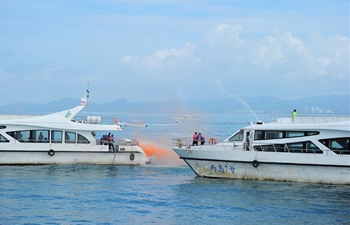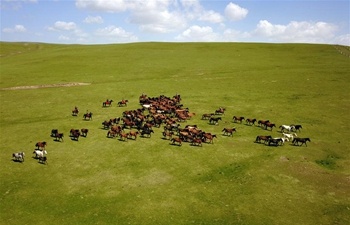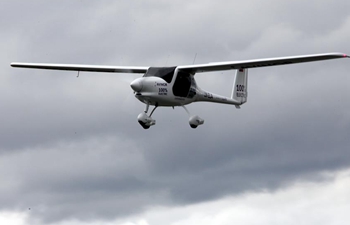by Raul Menchaca
MAISI, Cuba, June 23 (Xinhua) -- Idalgo Matos and his wife Eufrasia Manzanet have the rare privilege of being the first Cubans to watch the dawn arrive every day.
Matos has been working for 37 years in the Punta Maisi Lighthouse, which was built in 1862 over 1,000 kilometers to the east of Havana.
Every day for the last 156 years, the light atop the tower has guided ships during their crossing of the complicated Windward Passage that separates the islands of Cuba and Hispaniola.
The tower, 37 meters high, is located a few meters away from the shore. The waves can be heard as a muted rumor, which grow to a roar when the sea is enraged and they smash with force against the coastline.
The lighthouse keeper, a thin and tanned man, speaks slowly when commenting on life in the town, where a few houses, a small hotel and a center for Haitian refugees surround the lighthouse.
Matos recalls that the tranquility of the site won his heart after he arrived in the area to work as a telegraphist.
"Actually it was my decision. I liked it, I was curious about the lighthouse and I tried to get a job here," he explains.
Matos describes the great peace he feels in the area, which was only broken when a hurricane approached and the small Maisi community was evacuated.
"Our house is strong so we can stay, although the lighthouse goes off at that time because it is assumed no ships will be navigating," he said.
Married for 26 years, his wife also enjoys the area, "which is a very quiet place, where there are no problems."
Their four daughters and six grandchildren live outside of Maisi and "closer to civilization" but the couple has no desire to leave the lighthouse.
"I am already adapted to this work system, I know it well, I master it and I feel very good," says Matos with a smile.
The Windward Passage is a hard strait to cross while being very busy. Between 40 and 50 ships of different sizes come through every day, which makes the work of the lighthouse keeper indispensable.
The flash coming from the beacon every five seconds is the result of Matos' endurance as he climbs the hundred wooden spiral steps barefoot several times a day.
"The lighthouse starts working at 6:25 p.m. and goes out at 6 a.m.," explains the lighthouse keeper.
The movement of the light is done by a counterweight, like the pendulum of a clock, and although the optics are turned on and off from below, the rotation mechanism must be wound manually.
Matos must also manually open and close the blinds that protect the crystals at the top of the tower.
Climbing the stairs without shoes is a decision associated with the 1994 visit of former Cuban President Raul Castro, who suggested that he walk barefoot to protect the paint on the steps.
Meanwhile, Matos is also in charge, along with a younger colleague, of the cleaning, painting and maintenance of the facility.
Although everyone calls it the "Punta Maisi lighthouse," its real name is Concha, in honor of the Spanish governor of the island, Jose Gutierrez de la Concha (1809-1895).
Perhaps the worst moment in the 156 years of the tower occurred in October 2016, when Hurricane Matthew, considered the most powerful of the last decade, lashed eastern Cuba.
However, neither the powerful gusts of wind nor the fearsome waves could damage the lighthouse, a place where Matos and his wife have the privilege of being the first in the country to see the sunrise.

















